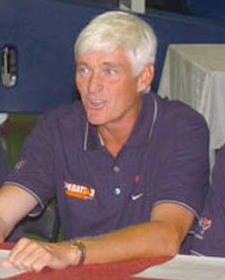Georgia Tech
Cremins's performance at Appalachian State gathered him some national attention in the NCAA coaching ranks, including catching the eye of Georgia Tech athletic director Homer Rice. After Rice persuaded him to come to Atlanta, Cremins was hired as the Yellow Jackets' new head basketball coach at the close of the 1981 season, on April 14, 1981.
When Cremins arrived at Georgia Tech, he walked into a situation that was as bad, if not worse, than what he'd inherited at Appalachian State. Georgia Tech had only notched one winning season in the previous 10 years, and had just suffered the worst season in school history—a 4–23 overall record and a winless record in Atlantic Coast Conference play.
Considering the poor state of the program he'd inherited, Cremins engineered a very quick return to respectability. In only his third year in Atlanta, he led the Yellow Jackets to the 1984 NIT—their first postseason berth of any sort in 13 years. A year later, the Yellow Jackets shocked the ACC by winning a share of the regular season title, then winning the official league title in the conference tournament. They then advanced all the way to the Elite Eight, tallying an overall record of 27–8. In 1990, Cremins's team advanced all the way to the Final Four in the NCAA Tournament, with an overall 28–7 record. The 28 wins are still a school record for wins in a season.
Cremins was three times the ACC "Coach of the Year": In 1983 with the first ever Yellow Jackets' ACC tournament victory, and an overall 13–15 won/loss record; again in 1985, and again in 1996 when his team posted a 24–12 record, won the ACC regular-season championship with a 13–3 record (only the second time in 15 years that a team from North Carolina had not won at least a share of the title), and progressed to the NCAA basketball tournament's "Sweet 16" before losing to Cincinnati. Cremins' coaching of the 1990 Yellow Jackets' team earned him the Naismith College Coach of the Year honor.
Cremins had a host of players that went on to have successful NBA careers. First there was Mark Price (the Cleveland Cavaliers) and John Salley (the Detroit Pistons) in the early 1980s, followed by Duane Ferrell, Tom Hammonds, Dennis Scott, Brian Oliver, Kenny Anderson, Jon Barry, Travis Best, Stephon Marbury, Jason Collier and Matt Harpring.
Cremins was an assistant coach on the first-ever gold medal-winning American World University Games team in 1986, assisting the head coach Lute Olson of the University of Arizona. Cremins also assisted Olson at the 1986 FIBA World Championship, also winning the gold medal there. [1] During the summer of 1989 he coached the American team that qualified for the 1990 FIBA World Championship.
Cremins assisted former NBA coach Lenny Wilkens in the American basketball team's appearance in the Summer Olympic Games of 1996 in Atlanta. This team was the second of the "Dream Teams" in the Olympic Games, and it featured such NBA stars as Charles Barkley, Karl Malone, Reggie Miller, Shaquille O'Neal, Scottie Pippen, David Robinson and John Stockton, several of whom were returning for their second Olympic Games basketball tournament. This "Dream Team" was undefeated in the Olympic basketball tournament, of course, and it defeated the second-place Yugoslavian team 95–69 in the championship game in winning the gold medal.
On March 24, 1993, Cremins agreed to coach basketball at his alma mater, the University of South Carolina, before changing his mind and deciding three days later to continue at Georgia Tech. In 2003, Georgia Tech officially named the basketball court at the Alexander Memorial Coliseum on the Georgia Tech campus, the "Cremins Court". Paul Hewitt would take his place at Georgia Tech in 2000.
Cremins announced his retirement after the 1999–2000 season with a 25-year coaching record of 452–303 (a winning percentage of .599), and with a Georgia Tech coaching record of 354–237 in 19 seasons (also a .599 winning percentage). He is far and away the winningest coach in Georgia Tech history.
With his platinum blond hair, Cremins was an iconic figure at Georgia Tech. It was very common for fans to show up at Alexander Memorial Coliseum wearing blond wigs.
Cremins was a member of the 2006 induction class in the Georgia Tech Sports Hall of Fame.
College of Charleston
Turning down numerous offers to coach during his retirement, and even an occasional athletic directors job, Cremins toured the country doing motivational speaking, did television commentary on ACC and NCAA basketball, and worked with charities, mainly for Coaches vs. Cancer and the Jimmy V Foundation. Cremins also raised money for a five-to-six week summer program, half of which include disadvantaged children, the Hilton Head Basketball Camp 101.
In 2006, Cremins returned to coaching at the College of Charleston, hoping to restore the basketball program there to the mid-major power status that it experienced under coach John Kresse from 1980 to 2002. To some degree, Cremins succeeded, leading the team to four twenty-win seasons in his six seasons there, in addition to signing the highest-rated high school recruit in school history, Adjehi Baru. Another highlight of Cremins' tenure was a home upset over a North Carolina team ranked number nine in the country on January 4, 2010. [2]
Having taken a medical leave of absence on January 27, 2012, which lasted for the duration of the 2011–2012 season, Cremins retired from coaching on March 19, 2012, citing physical exhaustion.
